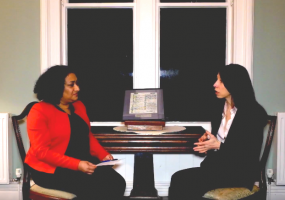Marked differences between countries in reporting of climate change
15 Nov 2010
A new RISJ study of international media has analysed the marked differences between countries in the coverage given to the UN's Copenhagen summit on climate change in 2009. It finds that of the 12 countries studied, Brazil and India provided the most coverage, followed by Australia and the UK. Meanwhile, Nigeria, Russia and Egypt gave the summit the least space in its newspapers.In "Summoned by Science: Reporting Climate Change at Copenhagen and Beyond", researchers analysed more than 400 articles published in the print media in 12 countries from the developed and developing world. They found that the media in all the countries tended to 'under-report' climate science during the summit. Articles written principally about the science of climate change represented less than a tenth of all the coverage surveyed. Nearly 80 per cent of the articles mentioned the science in less than 10 per cent of their column space. The views of climate change sceptics were quoted in the Western press but not by media in the developing world. The study suggests this is partly because coverage of the hacked emails at the University of East Anglia or 'Climategate' was largely concentrated in developed countries, primarily the UK and the US. The study is thought to be the first detailed assessment of who attended Copenhagen. Using official UN figures, it found that 4,000 journalists from 119 countries were at the summit. More than eight out of every ten journalists (85 per cent) came from the developed world, but nearly 600 were from the main negotiating bloc representing the interests of the developing world (G-77 plus China). China and Brazil were best represented, with more than 100 journalists each. Brazil had the largest official delegation, followed by Denmark, China, the USA and the UK. The international environmental activist network, Greenpeace, had a larger number of representatives than the whole of the official UK delegation. Around 2,000 members of delegations from 250 universities were present at Copenhagen, including 280 professors. But scientists from universities represented only 12 per cent of those quoted on the science, says the study. The study also surveyed over 50 environmental journalists and scientists across the 12 target countries post-Copenhagen asking them how climate change science might be best communicated. The recommendations include: More (re-)engagement by climate scientists with journalists to explain where there is scientific consensus and where there is not More dedicated climate change press officers at universities and research centres More media personnel at the IPCC More imaginative use of new media Less adversarial coverage of climate science, but more frontline reporting on what people are experiencing and what they are doing about it. The study was carried out with the close collaboration and assistance of the British Council's Climate Change programme and written by James Painter, a researcher at the RISJ. Mr Painter commented: 'The science of climate change was under-reported when the opportunity was self-evident. Getting the science into the media will remain even more of a challenge at a time when audiences and editors in many countries are suffering from climate fatigue.' 'We need more discussion between scientists, journalists and policy-makers on how to keep highly significant, slow-burn issues like climate change interesting and engaging to different audiences around the world.' Dr Rebecca Nadin, Director of the British Council's Climate and Sustainability project who contributed research to the study, said: 'Journalists and other key communicators often lack the knowledge base, skills and online and offline resources to cut thought the confusion and accurately report on the complex science of climate change and this can be especially true in developing countries.' 'Since the media play a pivotal role in educating the public about the impact of climate change it is essential to build climate change reporting skills and capacity and foster cross cultural media networks that promote best practices for reporting.'




